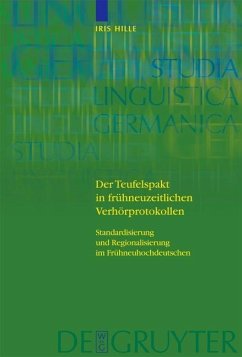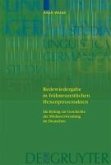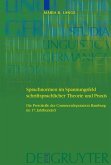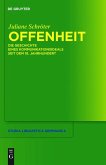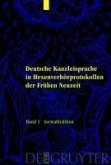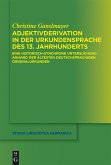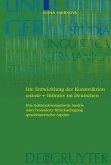This study focuses on the systematic linguistic analysis of stereotypical structures of statements on the topic of 'pact with the Devil' as they have been recorded in numerous extant records of early modern interrogations of women accused of witchcraft. Based on a supra-regional text corpus comprising more than 200 interrogation records, the statements of the accused are examined for standardisation tendencies and for characteristics of regional language usage; the findings are interpreted against the background of political, social and cultural historical references.
Dieser Download kann aus rechtlichen Gründen nur mit Rechnungsadresse in A, B, BG, CY, CZ, D, DK, EW, E, FIN, F, GR, HR, H, IRL, I, LT, L, LR, M, NL, PL, P, R, S, SLO, SK ausgeliefert werden.
"[...] so liefert diese [Untersuchung] einen interessanten Beitrag zur Hexenforschung, gerade indem sie sich solchen Bestandteilen der Überlieferung widmet, die als vermeintliche Stereotype sonst leicht übergangen werden."
Nicolas Rügge in: Zeitschrift für Historische Forschung 38. Jahrgang, 3/2011
"Die ebenso glänzend geschriebene wie methodisch innovative Studie [...] schafft es, indem sie Sprache als kulturkonstituierendes Mittel tatsächlich einmal ernst nimmt, ein wichtiges Problem in der historischen Kulturanthropologie zu erklären. [...] Eine Studie, die in ihrer kontrollierten Verbindung von Sprach-, Rechts-, Mentalitäts- und Alltagsgeschichte in der Früheneuzeitforschung ihresgleichen sucht."
Schubert in: Archiv für Reformationsgeschichte - Literaturbericht Jahrgang 40/2011
Nicolas Rügge in: Zeitschrift für Historische Forschung 38. Jahrgang, 3/2011
"Die ebenso glänzend geschriebene wie methodisch innovative Studie [...] schafft es, indem sie Sprache als kulturkonstituierendes Mittel tatsächlich einmal ernst nimmt, ein wichtiges Problem in der historischen Kulturanthropologie zu erklären. [...] Eine Studie, die in ihrer kontrollierten Verbindung von Sprach-, Rechts-, Mentalitäts- und Alltagsgeschichte in der Früheneuzeitforschung ihresgleichen sucht."
Schubert in: Archiv für Reformationsgeschichte - Literaturbericht Jahrgang 40/2011

